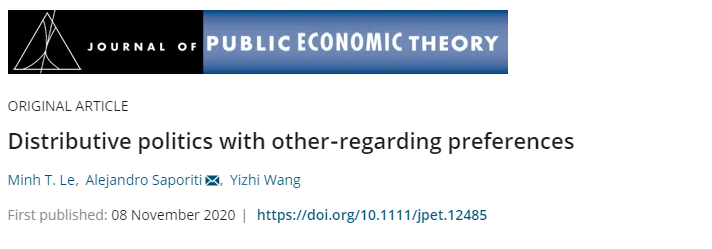时间:2020-11-10

Distributive Politics with Other-Regarding Preferences
Journal of Public Economic Theory, 2020
Minh T. Le, Alejandro Saporiti, Yizhi Wang
Abstract
This paper analyzes a nonsmooth model of probabilistic voting with two parties and a broad family of other‐regarding behavior, including fairness and quasi‐maximin preferences, income‐dependent altruism, and inequity aversion. The paper provides conditions for equilibrium existence and uniqueness. It also characterizes the Nash equilibrium in pure strategies when parties hold either symmetric payoffs, or minor forms of asymmetries. The characterization shows that the two parties converge to an equilibrium policy that maximizes a mixture of a “self‐regarding utilitarian” social welfare function and an aggregate of society’s other‐regarding preferences. These results are shown to be applicable to other nonsmooth frameworks, such as probabilistic voting with loss averse voters. The characterization also shows that the direction and the size of the inefficiencies emerging from electoral competition depend in a subtle way on the nature of the other‐regarding preferences (and resp., loss aversion).
摘要:本文通过构建一个引入多种利他偏好(包括公平偏好(Fairness Concern)、不平等厌恶偏好(Inequity Aversion)等)的概率投票模型,研究了利他偏好对财富分配效率的影响。文章提出了均衡存在性以及唯一性的条件,并且在政党目标一致或者有些许差异的情况下刻画了该博弈的纯策略纳什均衡。均衡的政策是最大化全社会的利己偏好以及利他偏好加权平均的社会福利函数。研究结果表明,由政治竞争所带来的经济效率损失的大小和方向与公民的利他偏好有着密切的关系。公民的利他偏好可以缓解由政治竞争带来的财富分配低效问题。本文的结论也可以应用在其他不平滑偏好的研究中,例如损失厌恶(Loss Aversion)对财富分配的影响。
研究意义:利他偏好对于人们的各种决策都有显著的影响,但已有研究尚未涉及到其在财富分配政策中的影响。在一般的财富分配模型中,政治竞争会带来分配效率的损失。那么人们的利他偏好将对这样的效率损失大小产生什么样的影响?本文的贡献主要在于:不仅从理论上证明了均衡的存在性和唯一性,并且进一步研究明确了利他偏好和政治竞争所带来的效率损失的关系,即公民的利他偏好可以缓解由政治竞争带来的财富分配低效问题。
文章全文参见链接:https://onlinelibrary.wiley.com/doi/abs/10.1111/jpet.12485